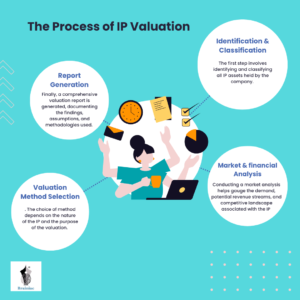Introduction
Intellectual property (IP) has emerged as a valuable asset that can make or break a company in today’s swiftly changing business environment. Whether you’re a startup seeking to make a name for yourself or an established company seeking to maintain your competitive edge, grasping the significance of intellectual property valuation is essential. This article seeks to illuminate the significance of intellectual property valuation, demystify the valuation process, and provide actionable advice for businesses of all sizes.
What is IP Valuation?
The process of determining how much an organization’s various intellectual property holdings are worth is known as IP valuation. It entails examining various forms of intellectual property, such as patents, trademarks, copyrights, and trade secrets, to establish their market value and determine whether or not they have the potential to generate money. IP valuation helps identify the monetary value of intangible assets and how much of a contribution they make to the overall value proposition of a firm, in the same way that traditional valuation estimates the value of a company’s tangible assets.
Importance of IP Valuation for Startups
For startups, IP valuation plays a pivotal role in securing funding, attracting investors, and establishing credibility in the market. Here’s why it matters:
Attracting Investors: Investors seek assurance that a startup’s IP portfolio is protected and holds the potential for future growth. A well-structured IP valuation report showcases the value of a company’s intangible assets, providing investors with tangible evidence of the startup’s potential.
Competitive Advantage: Startups can differentiate themselves from competitors by leveraging their IP assets. Valuing IP helps identify unique selling points, creating a strong foundation for market positioning and attracting customers.
Protection Against Infringement: Valuation facilitates the identification of potential infringement risks, allowing startups to take the necessary measures to protect their IP rights. By understanding the value of their IP, startups can make informed decisions regarding licensing, partnerships, and litigation strategies.
Importance of IP Valuation for Established Businesses
IP valuation is not limited to startups; established businesses can also reap significant benefits:
Mergers and Acquisitions: During mergers and acquisitions, IP valuation helps determine the value of IP assets, facilitating negotiations and ensuring fair compensation for the IP owner. It also assists in evaluating the potential synergies arising from the combination of IP portfolios.
Licensing and Royalties: IP valuation guides businesses in establishing fair licensing agreements and royalty rates. It provides a benchmark for negotiations, ensuring that both parties receive a reasonable return on investment while maximizing revenue potential.
Risk Mitigation: Assessing the value of IP assets helps businesses identify and manage potential risks. By understanding the value of their IP, companies can make strategic decisions regarding portfolio diversification, asset monetization, and defensive measures against infringement.
The Process Demystified
While IP valuation may sound complex, breaking it down into four key steps can help demystify the process:
Identification and Classification: This includes patents, trademarks, copyrights, trade secrets, and even domain names. It’s crucial to assess the scope and legal protection of each asset.
Market and Financial Analysis: Conducting a market analysis helps gauge the demand, potential revenue streams, and competitive landscape associated with the IP assets. A financial analysis assesses the historical and projected financial performance linked to the IP, aiding in determining its value.
Valuation Method Selection: Different valuation methods exist, including cost-based, market-based, and income-based approaches. The choice of method depends on the nature of the IP and the purpose of the valuation. Consulting an IP valuation specialist can provide valuable insights in this regard.
Report Generation: Finally, a comprehensive valuation report is generated, documenting the findings, assumptions, and methodologies used. This report serves as a vital tool for decision-making, whether it’s attracting investors, negotiating licensing agreements, or defending IP rights in legal proceedings.
Conclusion
In today’s knowledge-driven economy, intellectual property has become a cornerstone for businesses across all sectors. Understanding the importance of IP valuation is crucial for startups and established companies alike. By valuing their intangible assets, businesses can make informed decisions, attract investors, mitigate risks, and maximize the potential returns from their IP portfolios. Embracing IP valuation is not just a strategic move; it is an essential step towards unleashing the hidden potential that lies within a company’s intangible assets.



